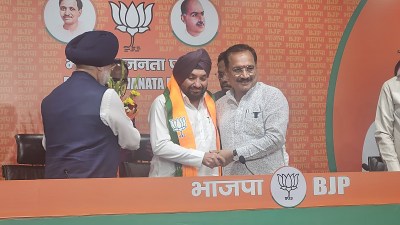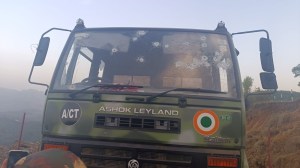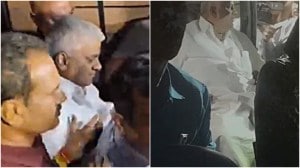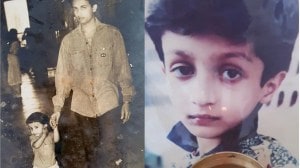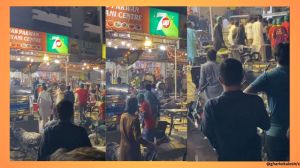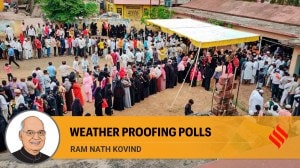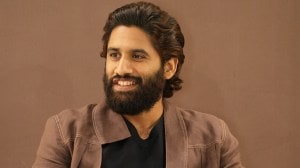- India
- International
In Maharashtra’s 8 seats, shifting caste equations, Oppn focus on local issues unsettle ruling NDA
Farm distress dovetails into Maratha anger, candidate selection disquiet, as BJP banks on “strong leadership” of Modi, Shah; INDIA leaves it to state leaders, candidate's personal connect, hyper-local issues
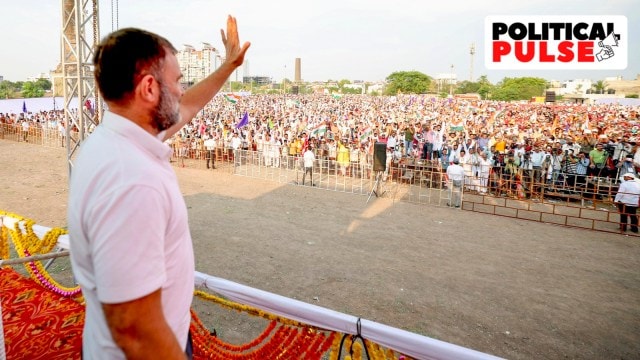 The Opposition, in fact, managed to keep the campaign hyper-local in several seats, making the functioning, efficiency and local connections of the candidate the issue. Congress leader Rahul Gandhi held one rally in Amravati on the last day of campaigning on Wednesday, but the rest of the campaign was led by local party leaders. (PTI)
The Opposition, in fact, managed to keep the campaign hyper-local in several seats, making the functioning, efficiency and local connections of the candidate the issue. Congress leader Rahul Gandhi held one rally in Amravati on the last day of campaigning on Wednesday, but the rest of the campaign was led by local party leaders. (PTI)The discourse across the eight Lok Sabha constituencies in Maharashtra that are scheduled to vote in the second phase on April 26 is witnessing a shift, with a shuffle in traditional caste equations, the rise of the vocal rural voter and the dominance of local factors.
Perhaps the most significant of these new factors is the silent wave among Marathwada’s Maratha community, in the wake of the directions of Maratha reservation agitation leader Manoj Jarange Patil, appealing to Maratha voters not to think of helping a particular candidate win, but instead to defeat those who are opposing OBC status to Marathas.
Out of the eight constituencies going to the polls Friday, Akola, Amravati, Wardha, Buldhana and Yavatmal-Washim are in Western Vidarbha, while Hingoli, Nanded and Parbhani fall in the Marathwada region of the state.
The ruling Mahayuti alliance banked on PM Modi, who held three public rallies in the region, along with campaigns by Shah.
For the Opposition INDIA bloc, Congress leader Rahul Gandhi held one rally in Amravati on the last day of campaigning on Wednesday, but the rest of the campaign was led by local party leaders, Shiv Sena (UBT) chief Uddhav Thackeray and Nationalist Congress Party (SP) chief Sharad Pawar.

The Opposition, in fact, managed to keep the campaign hyper-local in several seats, making the functioning, efficiency and local connections of the candidate the issue.
Marathwada
Despite repeated assurances by the state government led by Chief Minister Eknath Shinde that the 10% quota provided to the socially and educationally backward among the Marathas will survive in the Supreme Court, there is a strong undercurrent to the opposite effect within the community — giving the ruling Mahayuti alliance some scare. “He has told us to defeat those who have brought us to this situation, that is, the ruling side,” says Vishwanath Kalyankar, whose Prahar Party is a BJP ally.
Two days ago, Kalyankar, who belongs to Pimpalgaon, and others, were detained for a day, as former Congress CM-turned-BJP Rajya Sabha MP Ashok Chavan campaigned for the BJP’s Nanded candidate and sitting MP Prataprao Patil-Chikhlikar. Among those who have campaigned for him in Nanded are Prime Minister Narendra Modi and Union Minister Amit Shah.
Modi also held a rally in neighbouring Parbhani, for the ruling alliance candidate Mahadev Jankar of the Rashtriya Samaj Paksha (RSP). Jarange Patil’s village falls in Parbhani, and Jankar, an OBC, has a tough challenge before him. He is facing sitting MP Sanjay Jadhav of the Shiv Sena (UBT), a Maratha leader representing the INDIA bloc who is also expected to get the sympathy votes for Uddhav Thackeray in the wake of the split in his party.
Shankarrao Rajegore, a local farmers’ union veteran, says the anger over the Maratha quota issue has dovetailed with the concerns regarding agriculture. “Most Marathas are farmers. The crisis in agriculture has further intensified the need for reservations,” Rajegore says.
In Hingoli and neighbouring Yavatmal-Washim (which falls in western Vidarbha), the local leaders of the Shinde Sena are unhappy over ally BJP’s “interference” in ticket distribution. In both these seats, the two Senas are battling each other.
Western Vidarbha
In Yavatmal-Washim, which has seen many “farmer suicides”, Rajashri Patil, who has been parachuted in by the Shinde Sena, faces a tough task of overcoming the “outsider” tag as well as fighting the discontent against former Sena MP Bhavana Gawli. She is seen to have got the ticket as consolation, after her husband and incumbent Hingoli MP Hemant Patil wasn’t re-nominated.
In Buldhana — a bastion of the united Shiv Sena for two decades — a surprise entrant, farmer leader Ravikant Tupkar, is attracting huge crowds. “The almighty CM (Shinde) and his entire Cabinet had to come here multiple times just to defeat a farmer’s son. It just proves how farmers are uniting against this government,” Tupkar, who is contesting as an Independent, said at his meetings.
His entry has turned what was expected to be a bipolar battle between the Shinde Sena’s incumbent Prataprao Jadhav and the Uddhav Sena’s Narendra Khedekar into a triangular one.
In the three other seats of Western Vidharbha — Akola, Amravati and Wardha — change of candidates by the Opposition has disturbed established equations. In Akola, the Congress nominated a Maratha candidate, unlike the last two times, when it had fielded Muslim candidates. In Amravati, the Congress, which will be fighting the seat on its own symbol after 28 years, has given the ticket to a Buddhist Dalit candidate; while in Wardha — which gets polarised along Teli and Kunbi caste lines — the NCP (SP) has fielded a Kunbi candidate.
The Congress appears to be banking on a consolidation of three Ms — Maratha, Muslim and Mahar (major Scheduled Castes among Buddhist Dalits) — in the seats.
However, the Congress is facing allegations of taking the Muslims for “granted”, while Prakash Ambedkar’s Vanchit Bahujan Aghadi (VBA), whose alliance with the MVA ultimately didn’t come through, is likely to grab a share of the Mahar votes.
Akola resident Shagur Bhai says Muslim votes will consolidate behind any party that has a better chance of defeating the BJP. “There won’t be any division. Anyone with a winning chance will get the Muslim votes,” he says, without naming a party.
The BJP is facing several hitches in Akola and Amravati, where the local leadership has openly expressed its displeasure over their candidates. The Mahayuti is also expected to feel a blowback on the quota issue from the Kunbi-Maratha community, who earlier voted overwhelmingly for the BJP and the united Shiv Sena.
In Wardha, the clear divide between Kunbi-Maratha and Teli votes is visible. Here, incumbent BJP MP Ramdas Tadas is relying on Teli votes, while the NCP (SP) has given its ticket to former Congress MLA Amar Kale from the Kunbi community.
Since 2014, Teli support for the BJP is believed to have overpowered Kunbi numbers behind it. In 2019, what also helped its candidate Tadas win was the lack of a strong Kunbi in the fray. The Opposition hopes to get the Kunbi vote now, as well as a fair share of Teli voters with Kale projected as a young and fresh face, from a family with a good reputation across the region. In addition, the Opposition is hoping for Dalit and tribal votes.
Asked about the odds stacked against the ruling alliance, a top RSS functionary from Akola said they were confident. “We are not telling anyone whom to vote for, but we’re telling all to vote for a strong leadership. Ultimately, everyone will realise in the last 48 hours that it is important to vote for a stable government, and this will normalise everything,” he said.
Buzzing Now
May 04: Latest News
- 01
- 02
- 03
- 04
- 05


